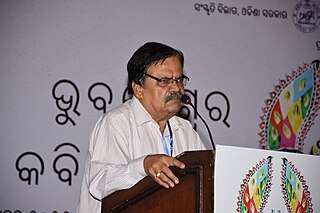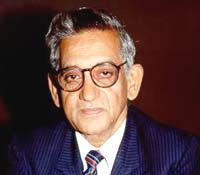
Jayanta Mahapatra is an Indian English poet. He is the first Indian poet to win a Sahitya Akademi award for English poetry. He is the author of poems such as "Indian Summer" and "Hunger", which are regarded as classics in modern Indian English literature. He was awarded a Padma Shri, the fourth highest civilian honour in India in 2009. He returned the award in 2015 to protest against rising intolerance in India.

Manoj Das was an Indian author who wrote in Odia and English. In 2000, Manoj Das was awarded the Saraswati Samman. He was awarded Padma Shri in 2001, the fourth-highest Civilian Award in India, Padma Bhusan in 2020, the third highest Civilian Award in India for his contribution in the field of Literature & Education.
Odia literature is literature written in the Odia language, mostly from the Indian state of Odisha. The modern Odia language is mostly formed from Tadbhava words with significant Sanskrit (Tatsama) influences, along with loanwoards from Desaja, English, Hindustani (Hindi/Urdu), Persian, and Arabic. Its earliest written texts date from around 1000 CE. The earliest Odia newspaper was Utkala Deepika, first published on August 4, 1866.

Sitakant Mahapatra is an Indian poet and literary critic in Odia as well as English. He served in the Indian Administrative Service (IAS) from 1961 until he retired in 1995, and has held ex officio posts such as the Chairman of National Book Trust, New Delhi since then.

Sachidananda Routray was an Indian poet, novelist and short-story writer who wrote in Odia. He received Jnanpith Award, the highest literary award of India, in 1986. He was popularly known as Sachi Routray.

Devdas Chhotray is an Indian Odia author, administrator and academician. He was the first vice-chancellor of Ravenshaw University, Cuttack, Odisha. His work consists of poetry, short stories, lyrics, musicals and screenplays. Chhotray's father Gopal Chhotray, a recipient of Padma, Central Sahitya Akademi and Sangeet Natak Akademi Award, was an architect of modern Odia theatre.
Dinakrushna Das (1650–1710) was a poet of Odisha, India, belonging to the Vaishnava tradition of bhakti movement. He is known for his Odia poem titled "Rasakallola", which is devoted to Lord Krishna. Among his many literary compositions, "Artatrana Chautisa" is a reputed one. Dinakrusna's Rasakallola and his standalone compositions including "chaupadi", "prabhati", "janana", "chautisa", "bhajana", and "malasri" are central to the repertoire of Odissi music, the traditional classical music of the state.

Brajanath Ratha was an Indian poet who wrote in Odia. Brajanath Ratha is internationally recognised and is the recipient of many prestigious awards like the Odisha Sahitya Academy Award, Vishuba Award, Gokarnika Award, First Shudramuni Sahitya Award and Honoured by South Korea's Ambassador, from Global Cooperation Society International, Seol, Republic of Korea for Contribution in World welfare, Cooperation and Services.

Jagannath Prasad Das is an Indian writer, poet, playwright and novelist who writes in Odia.

Srinivas Udgata, is a poet, story and drama writer, painter, novelist and translator from Odisha, India.

Padma Sachdev was an Indian poet and novelist. She was the first modern woman poet of the Dogri language. She also wrote in Hindi. She published several poetry collections, including Meri Kavita Mere Geet, which won the Sahitya Akademi Award in 1971. She also received the Padma Shri, India's fourth highest civilian award in 2001, and the Kabir Samman for poetry for the year 2007-08 given by Government of Madhya Pradesh, Saraswati Samman for the year 2015, Sahitya Akademi Fellowship in 2019.

Sitanshu Yashaschandra Mehta, better known as Sitanshu Yashaschandra, is a Gujarati language poet, playwright, translator and academic from India.
Satyanarayana Rajguru (1903-1997) was an Indian litterateur, epigraphist and historian. He was a curator and epigraphist at the Odisha State Museum and was a recipient of Sahitya Akademi Award, Bharati Bhushan award, Ganjam Sahitya Sammilani award, Odisha Sahitya Academy Award and Sarala Sanman. The Government of India awarded him the fourth highest Indian civilian award of Padma Shri in 1974.
Radha Mohan Gadanayak-ରାଧାମୋହନ ଗଡ଼ନାୟକ(Odia) (1911–2000) was an Indian poet of Odia literature, known for his ballads and poetic creations. The poet, considered by many as one of the major Odia poets of this century, was a recipient of the Sahitya Akademi Award, which he received, in 1975, for his poem anthology, Surya O Andhakar. The Government of India awarded him the fourth highest civilian award of Padma Shri in 1990.

Gopal Krishna Rath was an Indian Odia poet. He won Sahitya Akademi award for Odia literature in 2014 for his poetry collection Bipula Diganta.
Binod Chandra Nayak was an Odia writer. He was known for his writing that was influenced by modern poetry while being romantic. He was awarded the 1970 Kendra Sahitya Akademi award for his poetry collection Sarisrupa.
Mamata Dash is an Odia poet, writer and translator from Odisha, India. A moment beyond time She was awarded the Odisha Sahitya Academy Award for her poetry collection Ekatra Chandrasurya.

Soubhagya Kumar Misra in an Indian poet and writer from Odisha. The Sahitya Akademi India's National Academy of Letters, awarded him the Sahitya Akademi Award in 1986. He is a recipient of Gangadhar National Award (2013).

Manorama Mohapatra was an Indian writer, poet, and editor, working primarily in the Odia language. She wrote forty books consisting of novels and poetry, and edited an Odia newspaper, The Samaj. She was the recipient of several literary awards, including Odisha state's highest literary honor, the Odisha Sahitya Akademi Award in 1984. She was the first woman to be elected president of the Odisha State Sahitya Akademi, a literary organization for the state of Odisha.

Chandrasekhar Rath was an Indian Odia litterateur. In 2018, he was nominated for Padma Shri but could not receive it due to death.














